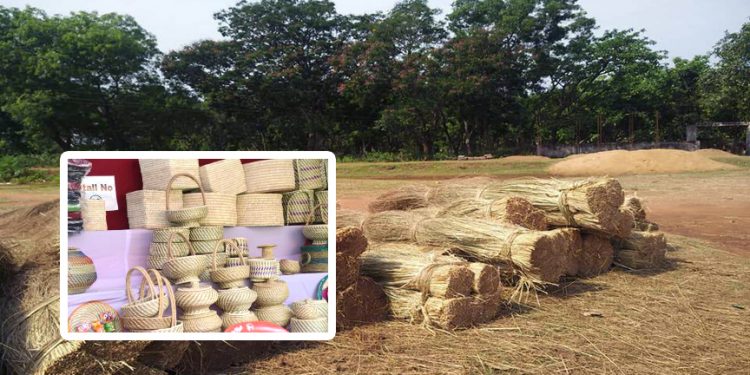Baripada: It’s not for nothing that Mayurbhanj district is called the hub of Sabai grass craft. The Sabai grass products have their loyal customers not only in India but also in abroad.
Worth mentioning, Odisha University for Agriculture and Technology has recently submitted an application to Geographical Indications Registry at Chennai seeking a GI tag for Mayurbhanj district’s Sabai grass craft.
In the tribal dominated Mayurbhanj district, most people earn their livelihood from selling minor forest produces. Sabai grass craft has also turned out to be a money spinner for many people.
The craftsmen earn their livelihood from selling their products the year round. According to sources, the annual business of these beautifully woven products touches something around Rs 300 crore per annum.
Sabai grass plants are called ‘Money Plants’ by the weavers, for it takes care of their financial requirement for the entire year. The grass usually grows better in non-irrigated lands.
Once planted, the grass is harvested from the same land continuously for 10/12 years.
While the grass, also known as ‘golden grass’ due to its colour, is grown in 22,758 hectares of land in the district, Baripada, Morada, Suliapada, Kuliana, Betanati and Kaptipada are the areas known for its cultivation. 20,000 MT grass is harvested in the district annually.
Once the grass comes up to the required length, farmers harvest them. They then spread the sheaves of grass out in sun to dry. Then the dried-up grass is procured by the self help groups.
There are a total of 21 SHGs where women manufacture as many as 1,062 products. These women are skilled in making a variety of products including jewellery, furniture, household articles, decorative and gift items using the grass.
These items are so enticing that they make way to viewers’ hearts instantly, prompting them to own some of them. These articles are available at dedicated selling centres at the district headquarters.
This apart, e-commerce companies like Flipkart, Amazon, Jabong sell these crafts. Because of being eco-friendly, durability and beauty, the demand for these crafts is only increasing by the day.
Last year, rakhis made of Sabai grass sold like hot cakes. These rakhis were sold through stalls set up in Baripada, Rairangpur and Bhubaneswar.
Notably, the Krishi Vigyan Kendra at Shyamakhunta requested OUAT to apply for the GI tag for the Sabai grass craft.
“Once the tag is accorded, the district’s residents, particularly the women weavers will become self-reliant,” observed scientist of Krishi Vigyan Kendra (1), Sanghamitra Pattanayak.
PNN






































